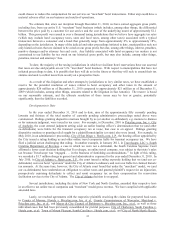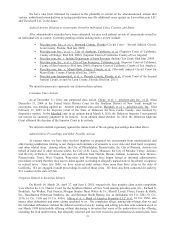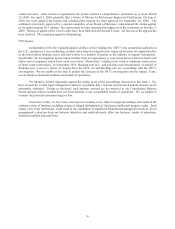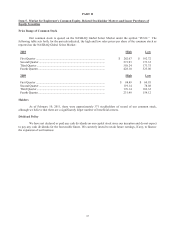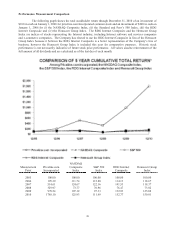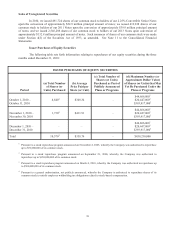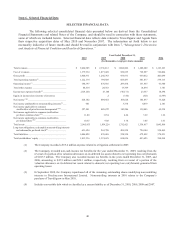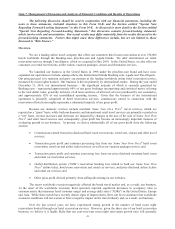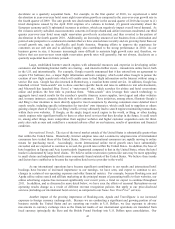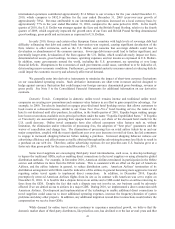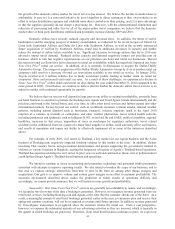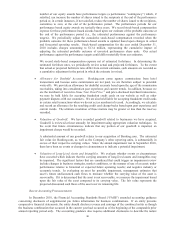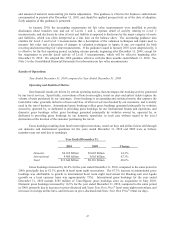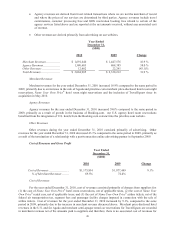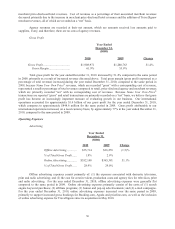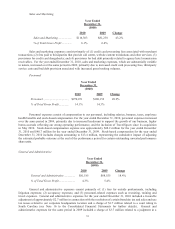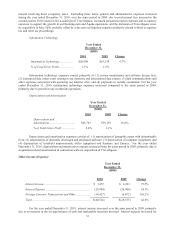Priceline 2010 Annual Report Download - page 116
Download and view the complete annual report
Please find page 116 of the 2010 Priceline annual report below. You can navigate through the pages in the report by either clicking on the pages listed below, or by using the keyword search tool below to find specific information within the annual report.42
decelerate on a quarterly sequential basis. For example, in the first quarter of 2010, we experienced a mild
deceleration in year-over-year hotel room night reservation growth as compared to the year-over-year growth rate in
the fourth quarter of 2009. The unit growth rate decelerated further in the second quarter of 2010 due in part to (1)
travel disruptions caused by the April 2010 eruption of a volcano in Iceland, (2) general uncertainty about the
European economy and (3) substantial increases in airfares, which can negatively impact overall travel demand. As
the volcanic activity subsided, macroeconomic concerns in Europe abated and airfare increases moderated, our third
quarter year-over-year hotel room night reservation growth rate accelerated, and then reverted to the pattern of
deceleration in the fourth quarter 2010. Additionally, an increasing amount of our business from a destination and
point-of-sale perspective is conducted in markets that we have entered more recently and are growing faster than our
overall growth rate, such as Asia-Pacific and South America. Ongoing efforts to improve the experience for
customers on our web site and to add hotel supply also contributed to the strong performance in 2010. As our
business grows in size, it becomes increasingly more difficult to maintain high growth rates and, therefore, we
believe that our year-on-year room night reservation growth rates will generally, but not always, decelerate on a
quarterly sequential basis in future periods.
Large, established Internet search engines with substantial resources and expertise in developing online
commerce and facilitating Internet traffic are creating – and intend to further create – inroads into online travel, both
in the U.S. and internationally. For example, Google recently announced that it has entered into an agreement to
acquire ITA Software, Inc., a major flight information software company, which could allow Google to pursue the
creation of new flight search tools which will enable users to find flight information on the Internet without using a
service like ours. Google has also invested in HomeAway, a vacation home rental service. In addition, Google has
launched a travel “meta-search” site to show searchers specific hotels and rates in addition to text advertisements,
and Microsoft has launched Bing Travel, a “meta-search” site, which searches for airfare and hotel reservations
online and predicts the best time to purchase them. “Meta-search” sites leverage their search technology to
aggregate travel search results for the searcher’s specific itinerary across supplier, travel agent and other websites
and, in many instances, compete directly with us for customers. These initiatives, among others, illustrate Google’s
and Bing’s clear intention to more directly appeal to travel consumers by showing consumers more detailed travel
search results, including specific information for travelers’ own itineraries, which could lead to suppliers or others
gaining a larger share of Google’s or Bing’s traffic or may ultimately lead to search engines maintaining transactions
within their own websites. If Google, as the single largest search engine in the world, or Bing, or other leading
search engines refer significant traffic to these or other travel services that they develop in the future, it could result
in, among other things, more competition from supplier websites and higher customer acquisition costs for third-
party sites such as ours and could have a material adverse effect on our business, results of operations and financial
condition.
International Trends. The size of the travel market outside of the United States is substantially greater than
that within the United States. Historically, Internet adoption rates and e-commerce adoption rates of international
consumers have trailed those of the United States. However, international consumers are rapidly moving to online
means for purchasing travel. Accordingly, recent international online travel growth rates have substantially
exceeded, and are expected to continue to exceed, the growth rates within the United States. In addition, the base of
hotel suppliers in Europe and Asia is particularly fragmented compared to that in the United States, where the hotel
market is dominated by large hotel chains. We believe online reservation systems like ours may be more appealing
to small chains and independent hotels more commonly found outside of the United States. We believe these trends
and factors have enabled us to become the top online hotel service provider in the world.
As our international operations have become significant contributors to our results and international hotel
bookings have become of increased importance to our earnings, we have seen, and expect to continue to see,
changes in certain of our operating expenses and other financial metrics. For example, because Booking.com and
Agoda utilize online search and affiliate marketing as the principal means of generating traffic to their websites, our
online advertising expense has increased significantly over recent years, a trend we expect to continue throughout
2011. In addition, and as discussed in more detail below, we have seen the effects of seasonal fluctuations on our
operating results change as a result of different revenue recognition policies that apply to our price-disclosed
services (including our international hotel service) as compared to our Name Your Own Price® services.
Another impact of the growing importance of Booking.com, Agoda and TravelJigsaw is our increased
exposure to foreign currency exchange risk. Because we are conducting a significant and growing portion of our
business outside the United States and are reporting our results in U.S. Dollars, we face exposure to adverse
movements in currency exchange rates as the financial results of our international operations are translated from
local currency (principally the Euro and the British Pound Sterling) into U.S. Dollars upon consolidation. Our


